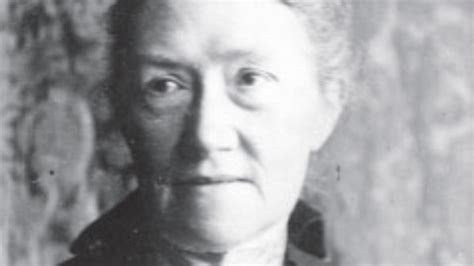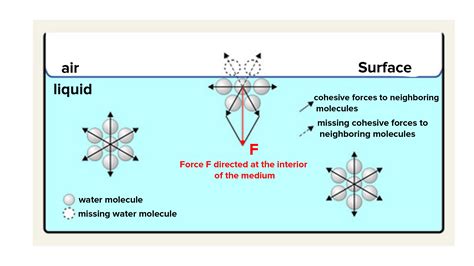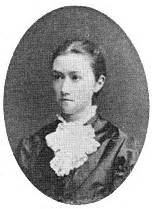In the vast realm of scientific pioneers, there exists an unsung hero whose groundbreaking work revolutionized the field of surface tension and laid the foundation for numerous scientific advancements. This is the story of a remarkable individual who dared to challenge the norms and carve a path of her own, transcending the barriers imposed upon her by society. With unwavering determination and intellectual prowess, her name etched indelibly into scientific history.
Agnes Pockels, a visionary scientist of the late 19th and early 20th centuries, embarked on a remarkable journey that defied the gender stereotypes prevalent during her time. Armed with an insatiable curiosity and a relentless pursuit of knowledge, she painstakingly unraveled the mysteries surrounding surface tension, a concept that had eluded scientists for centuries. Through her astute observations and meticulous experiments, Pockels emerged as a true trailblazer, forging new paths of understanding in the realm of physical chemistry.
Guided by an insatiable thirst for discovery, Pockels fearlessly explored the intricate relationship between molecules and interfaces, undeterred by the lack of formal scientific training available to women in her era. Her brilliance lay in her ability to combine scientific rigor with innovative experimental techniques, using everyday household materials to conduct her groundbreaking research. With humble ingenuity, she devised the first-ever method to measure surface tension, forever changing the landscape of scientific investigation.
Indeed, Pockels' contributions extend far beyond her significant advancements in the realm of surface tension. Her pioneering work has had a profound impact on diverse fields, ranging from physiology and biology to material science and nanotechnology. Her research opened endless doors for subsequent generations of scientists, who continue to build upon her foundational discoveries to this day. The legacy of Agnes Pockels stands as a testament to the power of intellectual curiosity and the indomitable spirit that drives scientific progress.
Agnes Pockels: A Pioneer in Surface Science

The extraordinary contributions of Agnes Pockels have marked her as an eminent figure in the field of surface science. Her pioneering work revolutionized our understanding of the interactions that occur at the interface of liquids and solids. Through meticulous experimentation and innovative observations, Pockels unraveled the intricate nature of surface tension and established its fundamental principles.
Pockels employed her keen intellect and passion for scientific inquiry to explore the behavior of liquid surfaces, a largely uncharted territory at the time. Her work revealed the significant role that molecules play in determining the properties of these surfaces, shedding light on phenomena such as wetting and the formation of surface films. By meticulously studying the impact of various substances on the surface tension of liquids, Pockels laid the groundwork for future advancements in surface science.
- Pockels developed a groundbreaking method known as the Pockels trough, which enabled precise measurements of surface tension. This innovation provided scientists with a powerful tool to investigate the effects of temperature, pressure, and different substances on liquid interfaces.
- She explored the surface behavior of various materials, including oils, soaps, and electrolyte solutions, elucidating their molecular arrangements and behaviors at the interface. These investigations revealed underlying principles governing surface tension and further expanded our understanding of intermolecular forces.
- Pockels' contributions extended beyond her own research. She influenced future generations of scientists through her meticulous documentation and publications, providing a comprehensive resource for the field of surface science.
Agnes Pockels' pioneering efforts in surface science have paved the way for countless advancements in fields ranging from materials science to biophysics. Her unwavering commitment to scientific exploration and her groundbreaking discoveries leave a lasting legacy that continues to inspire scientists today.
Early Years and Education
The beginnings of Agnes Pockels' journey into the world of science and discovery can be traced back to her formative years. Growing up, she displayed an innate curiosity and passion for understanding the natural world around her. This drove her to pursue an education that would enable her to delve deeper into the mysteries of the universe.
During her early education, Agnes demonstrated exceptional aptitude in various subjects including mathematics and physics. These academic achievements laid a strong foundation for her future endeavors as a scientist. She honed her analytical thinking and problem-solving skills, which would become invaluable tools in her later scientific investigations.
Academically inclined, Agnes continued her studies at renowned institutions, where she delved into an array of scientific disciplines. Through extensive research and hands-on experiments, she broadened her understanding of the intricate workings of the natural world. | Driven by an insatiable thirst for knowledge, Agnes eagerly immersed herself in the latest scientific advancements of the time. She closely followed the works of esteemed scientists, absorbing their ideas and inspirations. This continuous pursuit of intellectual growth fueled her ambition to contribute to the scientific community. |
Agnes' educational journey was not without challenges. As a woman in a predominantly male-dominated field, she faced considerable obstacles and prejudices. However, her determination and sheer passion for science propelled her forward, defying societal norms and expectations.
In the following decades, Agnes' educational pursuits would pave the way for her groundbreaking discoveries and profound contributions to the scientific world.
The Exploration of the Surface Tension Phenomenon

In the study of Agnes Pockels, an extraordinary scientist known for her pioneering work in the late 19th and early 20th centuries, a significant breakthrough was made in understanding the peculiar behavior of liquids at their interfaces. This ground-breaking investigation into what came to be known as the surface tension phenomenon brought to light a previously unrecognized force that influences the behavior of liquids at the molecular level.
The Surface Tension Concept:
During her meticulous experiments, Agnes Pockels uncovered an essential property of liquids that results in the cohesive forces acting at the surface. This characteristic, known as surface tension, describes the tendency of the molecules at the surface of a liquid to minimize their exposure to the environment by sticking together. It causes liquids to form droplets, exhibit capillary action, and display other intriguing phenomena.
Understanding Molecular Interactions:
By studying the behavior of various substances, Pockels sought to comprehend the molecular interactions responsible for the surface tension phenomenon. Her observations revealed that the surface tension of a liquid is influenced by factors such as temperature, pressure, and the presence of other substances. Through meticulous experiments and careful measurements, she devised methods to quantitatively study and characterize this intriguing force.
Applications and Significance:
The discovery of the surface tension phenomenon revolutionized many areas of science and technology, including physics, chemistry, biology, and engineering. It provided scientists with valuable insights into the behavior of liquids and played a crucial role in the development of diverse applications ranging from the design of efficient cleaning agents to the understanding of biological processes such as plant transpiration. Agnes Pockels' groundbreaking investigations paved the way for further advancements in our understanding of interfacial phenomena and their practical implications.
The Legacy of Agnes Pockels:
Agnes Pockels' tireless dedication to scientific exploration and her groundbreaking discoveries in the realm of surface tension have left an indelible mark on the scientific community. Her pioneering work continues to inspire new generations of scientists, promoting further research and technological advancements in a wide range of disciplines.
Impact and Legacy in Scientific Research
Agnes Pockels' contributions to the field of scientific research have left a lasting impact on various aspects of scientific inquiry. Her pioneering work in surface tension and her development of the Pockels trough have significantly advanced the understanding of fluid dynamics and contributed to the development of countless scientific applications.
Her groundbreaking research on surface tension not only provided key insights into the behavior of liquids at interfaces but also laid the foundation for further investigations in areas such as physical chemistry and materials science. By studying the properties of soap films and the behavior of different substances at the liquid-gas interface, Pockels opened new avenues for researchers to explore and understand various phenomena related to surface tension in numerous scientific disciplines.
Pockels' invention of the Pockels trough revolutionized the field of experimental surface science. This apparatus allowed for precise measurements and observations of the effects of liquid barriers on light polarization, contributing to advancements in the study of optics and photonics. The Pockels trough became an indispensable tool for researchers conducting experiments in surface science, leading to further discoveries and innovations in this field.
Furthermore, Pockels' dedication to scientific inquiry and her perseverance in a male-dominated scientific community continue to inspire future generations of scientists. Her achievements have paved the way for more inclusive and diverse participation in scientific research, highlighting the importance of equality and recognizing the potential of individuals regardless of their gender.
In summary, Agnes Pockels' remarkable contributions to scientific research and her innovative approach to understanding surface tension and fluid dynamics have had a profound and lasting impact on numerous scientific disciplines. Her legacy continues to resonate in the scientific community, inspiring advancements and fostering a more inclusive environment for scientific exploration and discovery.
Recognition and Honors for Agnes Pockels

In this section, we will explore the various acknowledgments and accolades that Agnes Pockels received throughout her career as a distinguished scientist. Her noteworthy contributions and groundbreaking research were widely recognized and celebrated by the scientific community and beyond.
| Year | Award/Honor | Description |
| 1891 | Olivier Prize | Pockels was awarded the prestigious Olivier Prize for her pioneering work in surface tension research. |
| 1904 | First Female Member of the Prussian Academy of Sciences | Pockels broke barriers and became the first woman to be elected as a member of the Prussian Academy of Sciences, a testament to her exceptional scientific contributions. |
| 1910 | Honorary Doctorate from the University of Göttingen | The University of Göttingen recognized Pockels' significant contributions to the field of physical chemistry by awarding her an honorary doctorate. |
| 1932 | Nobel Prize Nomination | Pockels was nominated for the Nobel Prize in Physics for her groundbreaking work in surface tension and its applications in studies of thin films. |
These remarkable acknowledgments and honors demonstrate the profound impact of Agnes Pockels' research and her status as a trailblazing scientist. She paved the way for future generations of female scientists and left an indelible mark on the field of physical chemistry.
FAQ
Who was Agnes Pockels?
Agnes Pockels was a remarkable scientist who lived from 1862 to 1935. She was a German physicist and chemist known for her groundbreaking work in surface science.
What were Agnes Pockels' main achievements?
Agnes Pockels made significant contributions to the field of surface science. She is best known for her invention of the Pockels trough, which allowed her to measure surface tension accurately. She also conducted pioneering research on molecular layers on the surface of liquids, which laid the foundation for modern surface chemistry.
Why is Agnes Pockels considered a remarkable scientist?
Agnes Pockels is considered remarkable because she was a self-taught scientist who made groundbreaking discoveries in the field of surface science at a time when women faced many barriers in pursuing scientific careers. Despite her lack of formal education, her work has had a profound impact on the understanding of interfacial phenomena.
How did Agnes Pockels' discoveries contribute to scientific knowledge?
Agnes Pockels' discoveries revolutionized the field of surface science. Her invention of the Pockels trough provided a precise method for measuring surface tension, which was crucial for understanding various physical and chemical phenomena. Her research on molecular layers on liquid surfaces also paved the way for the development of surface chemistry as a distinct field of study.
What challenges did Agnes Pockels face during her scientific career?
Agnes Pockels faced several challenges during her scientific career, primarily due to her gender. As a woman in the late 19th and early 20th centuries, she encountered prejudice and discrimination that limited her opportunities for formal education and scientific recognition. However, her perseverance and passion for science allowed her to overcome these obstacles and make significant contributions to the field.



